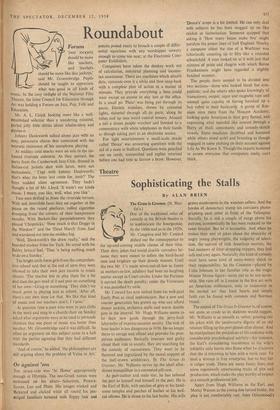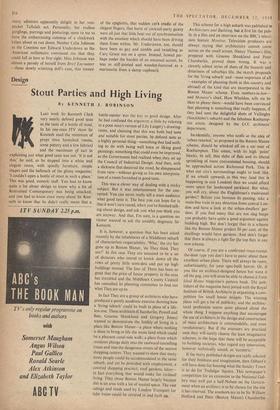Theatre
Sophisticating the Stalls
By ALAN BRIEN
ONE of the traditional roles of comedy in the British theatre is to sophisticate the bourgeoisie. In the 1660s and as in the 1920s, Mr. Congreve and Mr. Coward dished out the comeuppance to the up-and-coming middle classes of their time. Their dirty jokes had social double entendres be- cause they were meant to soften the hard-faced men and brighten up their dowdy women. Until the two Mr. C's made wives-out-of-law as funny as mothers-in-law, adultery had been no laughing matter except in Court circles. Under the Puritans it carried the death penalty; under the Victorians it was punished by exile.
Mr. Coward has now retired from his well-paid Emily Post as chief sophisticator. But a new and coarser generation has grown up who can afford dinner jackets, orchestra stalls and warm double gins in the interval. Mr. Hugh Williams seems to be their new guide through the jerry-built labyrinths of expense-account society. The task of bear-leader is less dangerous in 1958. He no longer dares to enrage and offend and provoke his pros- perous audiences. Basically insecure and guilty about their role in society, they are searching for the comedy of reassurance. They want to be flattered and ingratiated by the moral support of the half-crown aristocracy. In The Grass Is Greener, Mr. Williams serves up the ideal after- dinner tranquilliser in a coroneted pill case.
As part-author and male star, he has tailored the part to himself and himself to the part. He is the Earl of Ryle, with patches of grey at his hand- some temples and patches of leather at his well- cut elbows. He is down to his last butler. His wife grows mushrooms in the wineless cellars. And the hordes of democracy tramp his corridors photo- graphing each other in front of the Velasquez. Socially, he is still a couple of rungs above his patrons, economically he has been reduced to the same bracket. But he is accessible. And when he makes their sort of jokes about the obscurity of angry young playwrights, the vulgarity of televi- sion, the naiveté of rich American tourists, the bad manners of litter-dropping trippers, they feel safe and cosy again. Naturally this kind of comedy must have some kind of teeny-weeny shock to their respectability. So the Countess—played by Celia Johnson in her familiar role as the tragic Minnie Mouse figure—turns out to be too acces- sible. She runs Off to London in the first act with an American millionaire, only to rediscover in the second act that kind hearts and simple faith can be found with coronets and Norman blood.
The appeal of The Grass Is Greener is, of course, not quite so crude as its skeleton would suggest. Mr. Williams is as smooth as velvet, pouring out his jokes with the unobtrusive dignity of an old retainer filling up the port glasses after dinner. And he manipulates the prejudices of his audience with considerable psychological subtlety--for instance, the Earl's smouldering resentment at his wife's infidelity only bursts into flame when he discovers that she is returning to him with a mink coat. To steal a woman is free enterprise, but to buy her is vulgar trade. There are many funny lines, and some ingeniously entertaining tricks of plot and production, which make the play worthy of respect as a smooth professional job.
Apart from Hugh Williams as the Earl, and Moray Watson as the young don turned butler, the play is not Comfortably cast. Joan Greenwood's many admirers apparently delight in her vest- pocket Tallulah act. Personally, her endless gurglings, purrings and posturings seem to me to. have the embarrassing cuteness of a clockwork kitten about to run down. Neither Celia Johnson as the Countess nor Edward Underdown as the American millionaire convinced me that they could fall in love at first sight. Miss Johnson was almost a parody of herself from Brief Encounter --those slowly widening doll's eyes, that tremor of the epiglottis, that sudden cat's cradle of the elegant fingers, that burst of cocktail-party gaiety were all just that little beat out of synchronisation with the emotion which should have been driving them from within. Mr. Underdown, too, should have been as gay and nimble and twinkling as Cary Grant out on a spree. Instead, bowed per- haps under the burden of an assumed accent, he was as stiff-jointed and wooden-featured as a marionette from a damp cupboard.







































 Previous page
Previous page